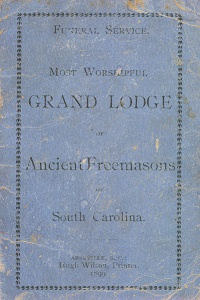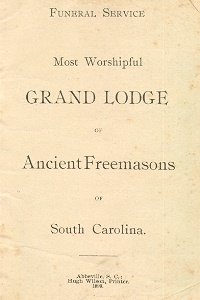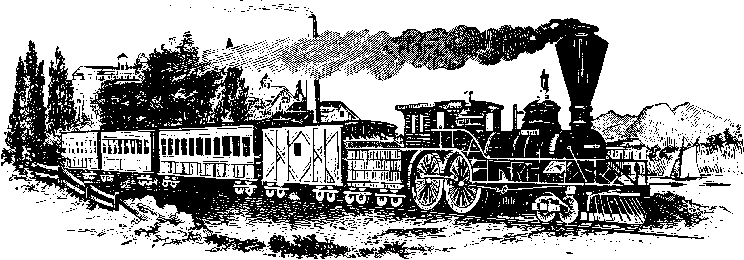 |
Funeral Service
Most Worshipful
Grand Lodge
of
Ancient Freemasons
of
South Carolina.
Hugh Wilson, Printer, Abbeville, SC, 1899
FUNERAL SERVICE.
|
 |
No Freemason can be interred with the formalities
of the Order, unless it be at his own request, or by that of some of his
family, communicated to the Master of the Lodge of which he died a member
(foreigners and transient brethren excepted); nor unless he has received
the Master's degree; and from this restriction there can be no exception.
Fellow Crafts and Apprentices are not entitled to funeral obsequies; nor
to attend the Masonic processions on such occasions.
When the Master of a Lodge receives notice
of a Master Mason's death, and of his request to be interred as a Mason,
he must satisfy himself of its propriety; and then, being informed of the
time appointed for the funeral, the Master may invite as many Lodges as
he may think proper, and the members of those Lodges may accompany their
officers in form; but the whole ceremony must be under the direction of
the Master of the Lodge to which the deceased belonged, and he and his
officers must be duly honored and cheerfully obeyed on the solemn occasion.
The proper clothing for a Masonic funeral,
is a black hat, black or dark clothes, white gloves and a plain white lambskin
apron, with a band of crape around the left arm above the elbow, and a
sprig of evergreen on the left breast. The Master's gavel, the Warden's
columns, the Deacon's and Steward's rods, the Tiler's sword, the Bible,
the Book of Constitutions, and the Marshal's baton, should be draped with
black crape. The officers of the Lodge and past Masters and Grand
Officers, may wear their official jewels.
The brethren being assembled at the Lodge
room, or some other convenient place, the Master of the Lodge to which
the deceased belonged opens the Lodge in the third degree.
A procession is then formed to the house of the deceased and thence to
the grave in the following order:
Tiler, with a drawn sword;
The Stewards;
Master Masons, two and two;
Treasurer and Secretary;
Senior and Junior Wardens;
Past Masters;
The Bible, Square, and Compasses, on a blue
Velvet cushion, covered with black cloth,
carried by the oldest member
of the Lodge;
The Master, supported by two Deacons;
The Officiating Clergyman;
The Corpse;
The Chief Mourner;
Other Mourners.
Before the procession begins, several of the
brethren should proceed to the church-yard, to prevent confusion, and make
the necessary preparations. The brethren are not to desert their
ranks, nor change places, but keep in their proper order. When the
procession arrives at the gate of the church-yard, the Lodge to which the
deceased brother belonged, and the mourners and attendants on the corpse,
halt, until the members of the other Lodges have formed a circle round
the grave, when an opening is made to receive them. They then advance
to the grave; where the clergyman and officers of the acting Lodge take
their station at the head of the grave, and the mourners at the foot. The
Marshal will remove the apron from the coffin to be handed in to the Master
at the proper time; the coffin is then lowered into the grave and after
the clergyman has concluded the religious services of the church, (unless
the same have been previously concluded) the Masonic service begins.
Master -- What man is he that liveth,
and shall not see death? Shall he deliver his soul from the hand
of the grave?
Brethren -- Man walketh in a vain
shadow, he heapeth up riches, and can not tell who shall gather them.
Master -- He cometh forth like a flower,
and is cut down; he fleeth also as a shadow, and continueth not.
Brethren -- When he dieth he shall
carry nothing away; his glory shall not descend after him.
Master -- Naked came he into the world,
and naked he must return.
Brethren -- Man dieth and wasteth
away; yea, man giveth up the ghost, and where is he?
Master -- All flesh shall perish together,
and man shall turn again unto dust..
Brethren -- As the waters fail f rom the
sea, and the flood decayeth and drieth up;
Master -- So man lieth down and riseth not;
till the heavens be no more thy shall not awake, nor be raised out of their
sleep.
Brethren -- The Lord gave, and the Lord
hath taken away, blessed be the name of the Lord.
Master -- Let us die the death of the righteous,
and let our last end be like his.
Brethren -- God is our God forever and ever;
he will be our guide even unto death!
Master -- Almighty Father! into thy hands
we comment the soul of our beloved brother.
The brethren answer three times, giving the
the grand honors each time, as follows:
Brethren -- The will of God is accomplished!
(To be said when the arms are extended across the
breast.)
So mote it be.
(To be said when the arms are above the head.)
Amen.
(To be said when the arms are at his side.)
The Master then hands the Memorial
Roll to the Secretary, saying:
Bro.
Secretary -- You will deposit this ...
<< Pages 7 - 10 are missing from the
center of the pamphlet. >>
Master -- Forasmuch as it hath pleased
Almighty God, in His wise Providence, to take out of the world, the soul
of our deceased brother, we therefore commit his body to the ground.
Earth to Earth.
Then the Senior Warden will cast
some earth on the coffin with the trowel.
Master -- Ashes to ashes.
The Senior Warden will
cast more earth.
Master -- Dust to dust.
The Senior Warden will
cast more earth.
The following invocations
are then made;
Master -- May we be true and faithful;
and may we live and die in love with our brother.
Brethren -- So mote it be.
Master -- May we profess what is good
and always act agreeably to our profession..
Brethren -- So mote it be.
Master -- May the Lord bless us, and
prosper us; and may all our good intentions be crowned with success.
Brethren -- So mote it be.
The Marshal then presents
the apron to the Master, who unfolds it and says:
Master -- The lambskin or white
leather apron is on emblem of innocence and the badge of a Mason.
The lamb has in all ages been deemed an emblem of innocence; by the lambskin
the Mason is, therefore, reminded of that purity of life and conduct which
is so essentially necessary to his gaining admission into the Celestial
Lodge above, where the Supreme Architect of the universe presides.
This emblem I now deposit in the grave of our deceased brother.
The Master then throws
the apron into the grave and says:
Master -- Glory be to God on high!
on earth, peace, goodwill to men!
Brethren -- So mote it be, now, from
henceforth, and for evermore.
The Master, displaying
the evergreen, says:
Master -- This evergreen is an emblem
of our faith in the immortality of the soul. By it, we are reminded
of our high and glorious destiny beyond the "world of shadows" and that
there dwells within our tabernacle of clay, an imperishable, immortal spirit,
over which the grave has no dominion, and death not power.
Here the Master and brethren deposit their
evergreens in the grave. They then form a chain, with the left arm
over the right, and march three times around the grave, while they sing
the following hymn:
AIR -- Pleyel's Hymn
Solemn strike the funeral chime --
Notes of our departing time,
As we journey here below,
Through a pilgrimage of woe.
Mortals, now indulge a tear,
For mortality is here!
See how wide her trophies wave
O'er the slumber of the grave!
Calm, the good man meets his fate,
Guards celestial 'round him wait!
See! he bursts these mortal chains,
And o'er death the victory gains.
The brethren then facing the grave, give the
public grand honors in the following manner:
-
Both arms are crossed on the breast, the left uppermost,
and the open palms of the hands striking the shoulders.
-
They are then raised above the head, the palms striking each
other.
-
They are then made to fall sharply on the thighs, with the
head bowed.
This is repeated three times. While the
honors are being given, each time the brethren will say:
We cherish his memory in our hearts.
(When the arms are crossed on the breast.)
We commend his soul unto God who gave it.
(When the hands are extended above the head.)
And consign his body to the earth whence it came.
(When the hands are extended towards the ground.)
The Master closes with the following exhortation.
Master -- From time immemorial
it has been a custom among the fraternity of Freemasons, at the request
of a brother on his death bed, or at the solicitation of his friends, to
accompany his body to the place of interment, and there to deposit his
remains with the usual formalities of our Order.
In conformity with this usage [and
at the special request of our deceased brother, whose memory we revere,
and whose loss we now deplore], we have assembled in the character of Freemasons,
to consign his body to the earth whence it came [and to offer up to his
memory before the world the last testimony of our regard]; thereby demonstrating
[the sincerity of our past esteem, and] our inviolable attachment to the
principles of the Order.*
*What is included within brackets may be omitted in the
case of transient brethren, or otherwise, as the officiating officer may
think fit.
The great creator having been pleased,
out of his wisdom and mercy, to remove our brother from the cares and troubles
of a transitory existence to a state of eternal duration, and thereby to
weaken the chain by which we are united, man to man, may we, who survive
him, anticipate our approaching fate. May we be more strongly cemented
in the ties of union and friendship; that during the short space allotted
to our present existence and probation, we may wisely and usefully employ
our time; and in the reciprocal intercourse of kind and friendly offices,
mutually promote the welfare and happiness of each other, to the honor
and glory of God, and the salvation of our own souls.
Unto the grave we have consigned the body
of our deceased brother, there to remain until the general resurrection,
in favorable expectation that his immortal soul may then partake of the
joys which have been prepared for the righteous from the beginning of the
world. And may Almighty God, in his infinite goodness, at the grand
tribunal of unbiased justice, extend his mercy to him and all of us, and
crown our hope with everlasting bliss in the realms of a boundless eternity.
This we beg for the honor of his name, to whom be glory now and forever.
Amen.
Brethren -- The will of God
is accomplished. So mote it be. Amen
Master -- From dust we came,
and unto dust we must return.
Brethren -- May we all be recompensed
at the resurrection of the just
Master and Brethren (in unison)
-- Friend and Brother, we bid thee a last, a long Farewell. Thou
art at rest from thy labors; may you rest in peace. So mote it be.
Amen.
The procession then returns to the place
whence it set out, where the necessary duties are complied with, and the
business of Freemasonary is renewed. The insignia and ornaments of
the deceased, if an officer of a Lodge, are returned to teh Master, and
teh Lodge is closed in the third degree with the usual benediction.
When a Grand Officer is interred, the service
is performed by the Grand Chaplain, and the procession arranged according
to the form of St. John's Day.
Andrews,
SC 29510 -
- Andrews Industrial
Park
Andrews, SC 29510 - A Great
Place to Live, Work, & Play!
 Let's
Take the Mail Train Back to Andrews, SC 29510!
Let's
Take the Mail Train Back to Andrews, SC 29510!
Webpage created by: Tim
Nesbitt
Copyright 1997 




